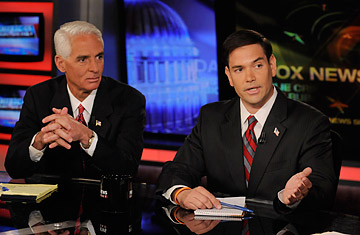
Florida Governor Charlie Crist, left, and former state house speaker and candidate for the U.S. Senate Marco Rubio in the Fox News studio in New York City on March 28, 2010
Florida Governor and GOP Senate candidate Charlie Crist went into his first debate against primary-election opponent Marco Rubio on Sunday with a nagging reminder of the deep hole his campaign has fallen into. Some voter polls in recent weeks showed Rubio leading Crist by 30 points or more; a more credible Mason-Dixon survey released on Friday still had the former Florida house speaker ahead of the governor by 11 points, 48-37, in a race many have labeled a critical battle between moderates and conservatives for the Republican Party's soul as it tries to rebound from its disastrous 2008 election losses. On Friday, new figures put recession-battered Florida's unemployment at 12.2%, the highest in the state's history — hardly a statistic any governor would want to carry into a debate.
So when Crist and Rubio squared off Sunday in a meeting televised nationally by Fox News, Crist came out swinging. He alluded early and often to mounting accusations that his rival has a history of using political donations for less-than-transparent purposes. Investigations by the Miami Herald and St. Petersburg Times have found that while a state legislator and speaker, Rubio made thousands of dollars in personal purchases with a GOP-issued American Express card that was supposed to be used only for election-related costs (he says he has paid it all back). Among other apparent breaches, Rubio also failed to disclose $34,000 in expenses for one of his political-action committees while his wife and relatives got questionable fees from those PACs.
Crist backers say the revelations fly in the face of Rubio's image as a pristine, fiscally conservative political outsider — and the narrowing of Rubio's lead apparent in the Mason-Dixon survey does suggest the reports are blunting his surprising surge. "Speaker Rubio," Crist charged in the Sunday-morning debate, "views public service as a way to enhance his personal enrichment." Noting Rubio has yet to disclose his tax returns, Crist even asked if his rival had been "doctoring the books."
Rubio called that accusation "outrageous" and said Crist is relying on desperate personal attacks to salvage a floundering campaign that enjoyed its own 30-point lead over Rubio this time last year. That was before last summer, when conservatives lashed out at what they saw as reckless big-government spending in Washington and cast Rubio as their man over the more moderate Crist. Rubio repeatedly hammered home his campaign message — that Crist had embraced President Obama's $787 billion economic stimulus plan, which Rubio calls a profligate failure. "I will stand up to [Obama] and everyone knows you won't," Rubio told Crist. Obama "is attempting to fundamentally redefine the role of government in America, and we can't cooperate with that."
Crist's conservative predecessor, Jeb Bush, has also called the governor's stance on the stimulus package an "unforgivable" mistake. But Crist, who critics say began pandering to his party's right wing last year when his primary poll numbers headed south, has at least stopped trying to back away from his support for the stimulus, which according to estimates has created some 87,000 jobs in Florida. "If we had taken the speaker's approach," Crist said, "we would have had 87,000 more people unemployed." The governor also dispelled speculation that he might drop out of the Aug. 24 primary election and run for the Senate as an independent.
Rubio, meanwhile, grappled with looming image problems of his own and was forced to refute the notion suggested by debate moderator Chris Wallace that he's trying to keep the conservative Tea Party movement and its fringe aura at arm's length. "I've been to 15 or 20 [Tea Party events] around the state," Rubio said.
Neither candidate really seemed to win the first debate — though Crist had more to lose by not winning. In fact, on one of the key subjects, taxes, both may have given a boost to the eventual Democratic candidate, given the fact that a fifth of Florida's electorate is independent. In order to plug a $2.2 billion hole in Florida's budget, Crist stumped not for new taxes but for new user fees — for example, higher costs for driver's licenses and annual motor-vehicle-tag renewals, not a popular proposition during a recession in a state where public transportation is thin and almost everyone drives. (Granted, the car-fee hike theoretically could be used to enhance public transit.) Rubio, meanwhile, touted his effort as speaker to eliminate property taxes and replace that lost revenue with increased sales taxes — an especially regressive idea in a low-wage state like Florida.
Right now polls indicate both Rubio and Crist would defeat the leading Democratic candidate, Congressman Kendrick Meek. But by fighting so hard to win over the GOP's right wing, both could still end up losing the rest of the Sunshine State.
